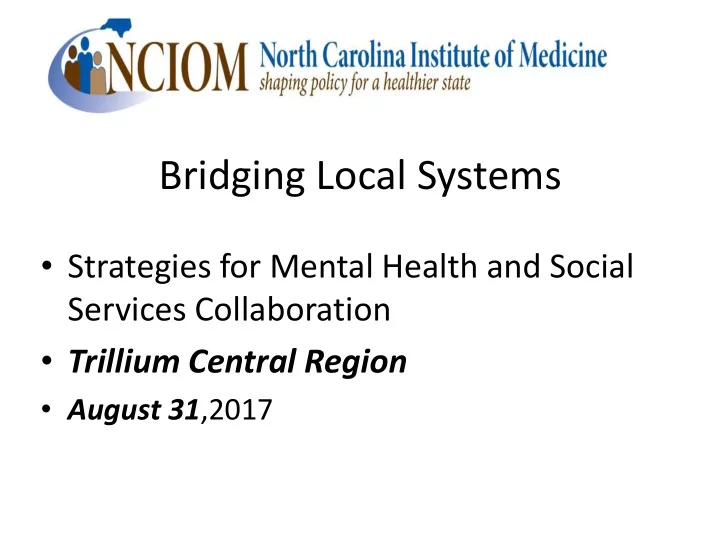

Bridging Local Systems • Strategies for Mental Health and Social Services Collaboration • Trillium Central Region • August 31 ,2017
Sponsors • NC Institute of Medicine • The Duke Endowment • The NC Department of Health and Human Services and its Divisions of – MH/DD/SAS – Social Services – Aging and Adult Services – Medical Assistance • The NC Council of Community Programs • The NC Association of County Directors of Social Services
Goals of Bridging Local Systems • Strengthen communication and collaboration between LME/MCOS and DSSs • Improve shared outcomes for two shared populations: – Children and families served by child welfare and behavioral health – Adults served by Adult Protective or Guardianship Services – Develop metrics to measure collaboration between DSSs and LME/MCOs
Agenda • Overview and introductions • Review previous meeting: What’s working well? What do you want to accomplish? • What relevant developments have happened since the first meeting? • Self-organizing follow up and follow through
Rules of the Road • Encourage creativity and flexibility • Look for opportunities to lead • Discourage non-productive criticism of each other • Avoid getting “lost in the weeds” of individual cases *We are creating ideas, not decisions. •
What’s Working Well • Child and Family Teams and System of Care meetings. • Care coordination is working well once a coordinator is assigned. • Some adult crisis situations are being handled well. • Some Trillium trainings are useful and appreciated. • DSS directors reported that the Trillium Regional Directors are helpful resources and good connections to the LME/MCO.
From the first meeting LME-MCO: What can we accomplish? • Our money has been reduced just like yours has. Can we offset some of the impact of reduced funding by finding new ways to help each other out? • Can DSS get the Innovations Waiver indicator in more promptly so we can paid appropriately? • Are there ways for our clients to get their food stamp applications processed faster? • Can DSS provide day care subsidies for children with IDD? • Can we agree to talk to each other before having our attorneys summons us to court?
LME-MCO: What can we accomplish? • How can we better educate clients (and maybe each other) about travel reimbursement for medical appointments for Medicaid covered individuals? • Can DSS provide in-home special assistance for more people who choose to live at home?
DSS: What can we accomplish? • How can we get more help for adults with residential placement needs? Special Assistance is often not enough. This is an APS issue. • Can our frontline staff get easier access to Trillium staff? The 1-800 # is perceived by some as an obstacle. • Can we figure out how to coordinate more effectively for individuals transitioning from facilities and state hospitals into the community?
DSS: What can we accomplish? • Can we get more stable funding for Community Support Teams? Problem: as consumers stabilize, services decrease which leads to destabilization and hospitalization. • How can we reduce the rate of service denials for Intensive in-home services, therapeutic foster care, PRTF? • How can we decrease the time required for service authorizations? This can take up two weeks or longer and if there is an issue you are starting over again and the child welfare agency “picks up the tab.”
DSS: What can we accomplish? • How can we work together to ensure consistent, high quality providers? • Are the denial rates for services substantially increasing? • Can our System of Care strengthen its ability to make changes and improvements in the system in addition to networking and cross training?
DSS: What can we accomplish? • How can we continue to meet challenges with accessing effective “mobile crisis” intervention? • How can families get help navigating access to higher levels of behavioral healthcare? • How does Trillium balance its values related to cost saving versus service delivery?
Priority Issues: Communication • Can we both agencies supply a contact list for who to call? • How does the Call Center facilitate better communication? • How should we communicate when we are under pressure? What are reasonable expectations for DSS, LME-MCO, and providers?
Priority Issues • Availability of Mobile Crisis Teams and Crisis Respite placements? • Need for adult placement options – what can we do? • Other? • Other?
Suggested Strategies • Develop online training resources • Promote the availability of online care coordination application • Reconvene quarterly leadership meeting to strengthen collaboration • Share contact lists • Create a workgroup to explore crisis solutions and placement disruptions
Feedback and Evaluation
Recommend
More recommend